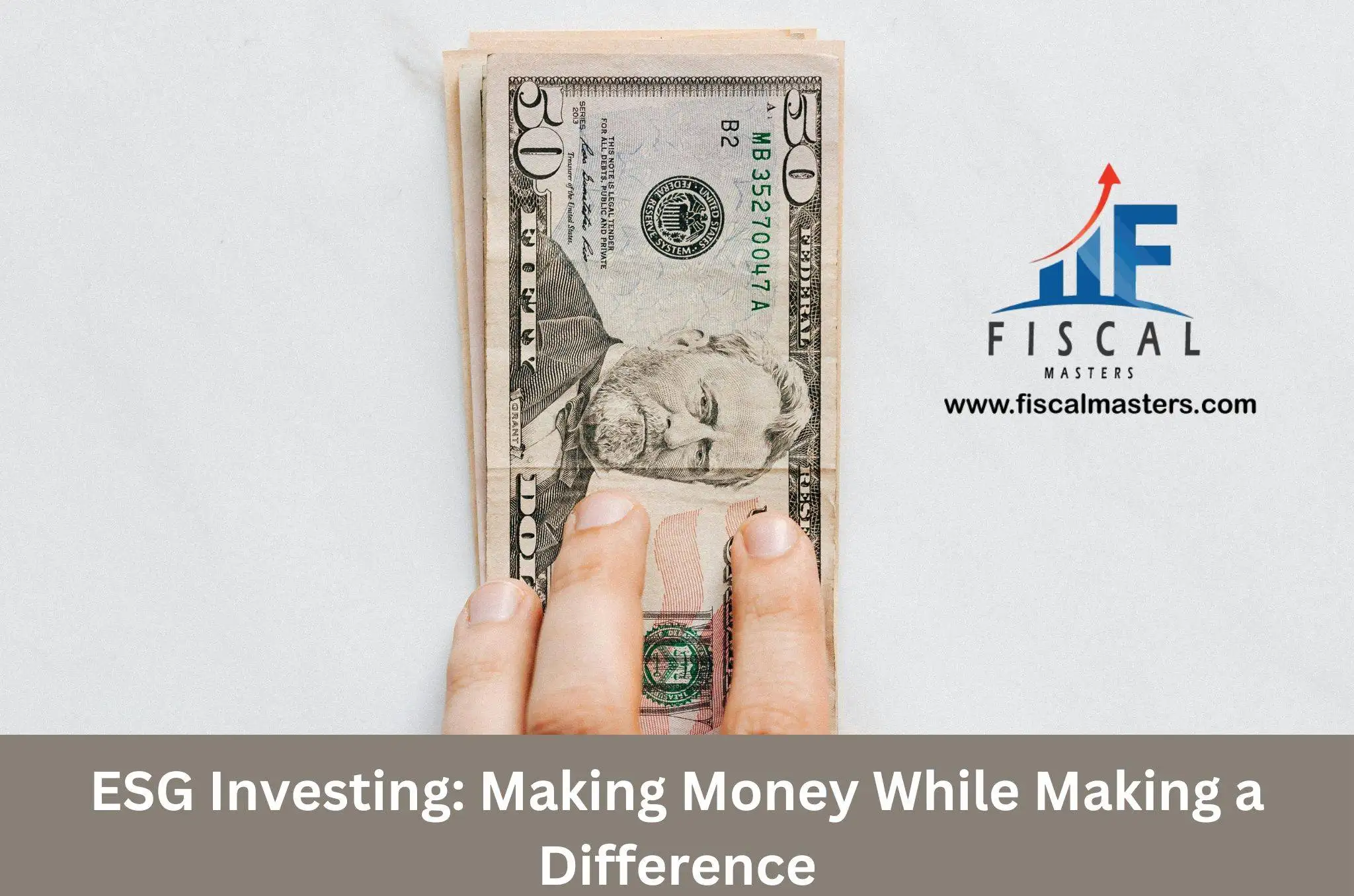Every dollar you invest has the power to shape the world. ESG investing is proof of that, transforming the investment landscape by aligning financial returns with social good. If you’ve ever wondered how your investments can contribute to a sustainable future while still growing your wealth, you’re about to find out. Let’s explore the dynamic world of ESG investing.

What is ESG Investing?
ESG investing stands for Environmental, Social, and Governance investing. It’s a strategy that incorporates these three critical factors into the investment decision-making process.
Investors evaluate companies based on how well they manage environmental issues (like climate change), social responsibilities (such as employee welfare and community engagement), and governance practices (including corporate leadership and ethics). This approach not only helps mitigate risks but also identifies opportunities for long-term growth.
ESG Investments: A Closer Look
The concept of ESG investments isn’t new, but its importance has surged in recent years. Companies that prioritize ESG factors are often more resilient and better equipped to handle future challenges.
For example, a company with strong environmental practices is less likely to face regulatory fines and public backlash, while a firm with good governance is usually better managed and less prone to scandals.
Read more: What is Sustainable Investing How to Align Your Profits with Environmental Goals
ESG Investing Trends
ESG investing trends have evolved rapidly, with an increasing number of investors and institutions recognizing its value. Some of the most notable trends include:
- Increased Transparency: More companies are disclosing their ESG practices, making it easier for investors to make informed decisions. This transparency is often driven by regulatory requirements and the growing demand from stakeholders for accountability.
- Technological Integration: Advanced data analytics and AI are being used to assess ESG performance more accurately. These technologies help investors identify companies that are genuinely committed to ESG principles rather than those engaging in “greenwashing” (falsely portraying their products or policies as environmentally friendly).
- Regulatory Support: Governments and regulatory bodies are pushing for greater ESG disclosures, encouraging more companies to adopt sustainable practices. For instance, the European Union’s Sustainable Finance Disclosure Regulation (SFDR) mandates financial market participants to disclose how they integrate ESG factors into their investment decisions.
ESG Investment Funds
ESG investment funds have become a popular choice for investors looking to diversify their portfolios while staying true to their values. These funds invest in companies that meet specific ESG criteria, offering a balanced mix of financial returns and ethical impact.
Popular types of ESG funds include mutual funds, exchange-traded funds (ETFs), and index funds, each providing varying levels of risk and return.

Types of ESG Investment Funds
- Mutual Funds: These are professionally managed investment funds that pool money from many investors to purchase securities. ESG mutual funds specifically target companies with strong ESG practices.
- Exchange-Traded Funds (ETFs): Similar to mutual funds, ETFs invest in a basket of securities. However, they are traded on stock exchanges, offering greater liquidity and often lower fees.
- Index Funds: These funds aim to replicate the performance of a specific index, such as the MSCI ESG Leaders Index, which includes companies with high ESG ratings.
ESG Investing Stocks
Investing in ESG stocks involves selecting individual companies that excel in environmental, social, and governance practices. These stocks often belong to companies that are leaders in sustainability, human rights, and corporate ethics.
Some top-performing ESG stocks include those from sectors like renewable energy, technology, and healthcare, where innovation and sustainability go hand in hand.
Check out: Mastering Your Finances: A Step-by-Step Guide to Creating and Sticking to a Monthly Budget
Examples of ESG Stocks
- Tesla Inc. (TSLA): Known for its electric vehicles and renewable energy products, Tesla is a leader in sustainable innovation.
- NextEra Energy Inc. (NEE): A major player in the renewable energy sector, NextEra Energy focuses on wind and solar power.
- Microsoft Corp. (MSFT): Microsoft has made significant strides in corporate governance and social responsibility, including commitments to carbon neutrality.
ESG Investment Strategies
There are several ESG investment strategies that investors can adopt, depending on their goals and risk tolerance:
- Negative Screening: Excluding companies or industries that do not meet certain ESG criteria (e.g., tobacco, fossil fuels). This is one of the oldest ESG strategies and is often used to avoid investments that are considered harmful or unethical.
- Positive Screening: Selecting companies that actively demonstrate strong ESG practices. This involves seeking out firms that are leaders in sustainability, human rights, and ethical governance.
- Thematic Investing: Focusing on specific ESG themes, such as clean energy or gender diversity. This strategy allows investors to target areas that align closely with their personal values or interests.
- Impact Investing: Investing with the intention to generate measurable social and environmental impact alongside a financial return. Impact investors often look for opportunities in sectors like affordable housing, education, and healthcare.
Read more: Managing Personal Finances: Ten Tips for Money-Saving to Achieve Your Financial Goals
Certificate in ESG Investing
For those interested in deepening their understanding of ESG principles, obtaining a certificate in ESG investing can be a valuable step. These programs provide comprehensive knowledge on how to integrate ESG factors into investment decisions, equipping investors with the skills needed to navigate this growing field. Some well-regarded programs include:
- CFA Institute Certificate in ESG Investing: This certification provides a detailed understanding of ESG issues and how they can be integrated into investment analysis.
- ESG Investing Online Course by Coursera: Offered by various universities, these courses cover the fundamentals of ESG investing, sustainable finance, and ethical investing.

Benefits of ESG Investing
The benefits of ESG investing extend beyond just financial returns. Some key advantages include:
- Risk Mitigation: Companies with strong ESG practices are generally better at managing risks related to environmental and social issues. For instance, a company that proactively addresses climate change is less likely to be impacted by regulatory changes or environmental disasters.
- Long-Term Performance: ESG-focused companies often demonstrate better long-term performance due to sustainable business practices. Studies have shown that companies with high ESG ratings tend to outperform their peers over the long run.
- Positive Impact: Investors can contribute to societal and environmental well-being by supporting companies that prioritize ESG factors. This not only helps address global challenges but also fosters a sense of purpose and fulfillment among investors.
- Enhanced Reputation: Engaging in ESG investing can enhance an investor’s reputation, showcasing a commitment to responsible and ethical investment practices. This can be particularly important for institutional investors who face increasing scrutiny from stakeholders.
ESG Investment Consulting
Many investors seek ESG investment consulting to help them navigate the complexities of ESG investing. These consultants provide expert advice on selecting suitable ESG investments, developing strategies, and ensuring alignment with personal or institutional values. Leading firms in ESG consulting include:
- Mercer: Offers comprehensive ESG advisory services, including portfolio construction, manager selection, and reporting.
- BlackRock: Provides ESG investment solutions and insights, leveraging their extensive research capabilities.
- Sustainalytics: Specializes in ESG research and ratings, helping investors make informed decisions based on robust data.
ESG Investment Management
ESG investment management involves overseeing a portfolio with a focus on ESG criteria. Professional managers use various tools and methodologies to assess ESG performance, ensuring that investments align with the desired ethical and financial outcomes. Key aspects of ESG investment management include:
- ESG Integration: Incorporating ESG factors into traditional financial analysis to enhance investment decisions.
- Active Ownership: Engaging with companies to encourage better ESG practices through dialogue and shareholder voting.
- Impact Measurement: Tracking and reporting on the social and environmental impact of investments to ensure they meet defined objectives.
Learn the basics: Understanding Investment Basics: Five startup sectors that you can invest in for financial success
Pros and Cons of ESG Investing
Like any investment strategy, ESG investing has its pros and cons:
Pros
- Alignment with Values: Investors can align their portfolios with their values and ethics. This can provide a sense of satisfaction and purpose, knowing that their investments support positive change.
- Better Risk Management: ESG factors help identify potential risks and opportunities. For example, companies with strong governance are less likely to encounter scandals or regulatory issues.
- Support for Sustainable Practices: Encourages companies to adopt more sustainable and ethical practices. This can lead to a broader positive impact on society and the environment.
Cons
- Limited Options: Some sectors may have fewer ESG-compliant investment opportunities. This can make it challenging to build a diversified portfolio that fully aligns with ESG criteria.
- Potential for Lower Short-Term Returns: ESG investments might underperform in the short term compared to traditional investments. However, many ESG-focused companies have demonstrated strong long-term performance.
- Complexity in Assessment: Evaluating ESG performance can be complex and subjective. Different rating agencies may use varying criteria, leading to inconsistencies in ESG scores.
Check out: A Beginner’s Guide: How to Start Investing in Stocks and Build Wealth
Conclusion
ESG investing represents a powerful fusion of financial acumen and ethical responsibility. By considering environmental, social, and governance factors, investors can make informed decisions that contribute to a sustainable future while still achieving their financial goals. As the world continues to prioritize sustainability and corporate responsibility, ESG investing is poised to play an increasingly crucial role in shaping the investment landscape.
Embrace ESG investing and let your money make a difference—not just for your portfolio, but for the planet and society as a whole.
